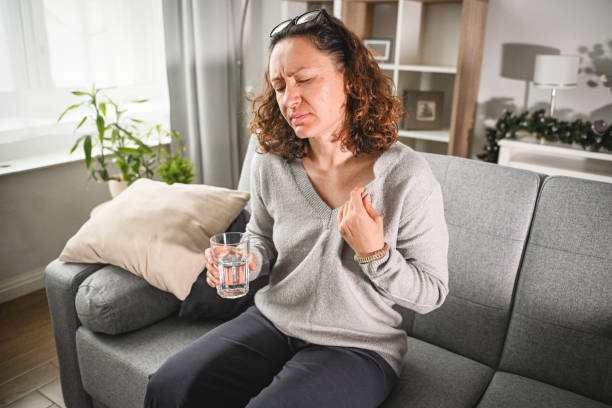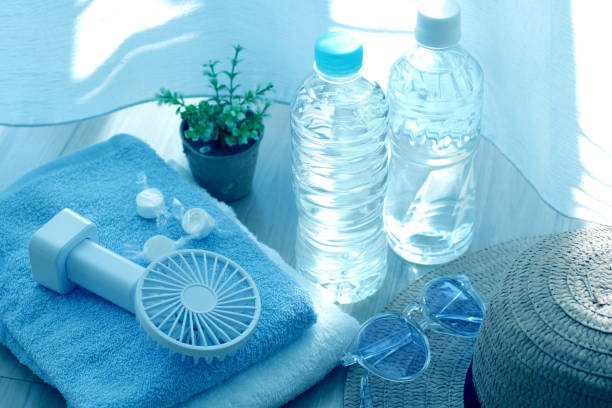
How to Reduce Body Heat Naturally and Quickly: Remedies, Causes & Foods
Time to read 8 min
Time to read 8 min
Table of contents
Body temperature measures your body's ability to produce and get rid of heat. The normal body temperature is 98.6 degrees Fahrenheit, which can go slightly higher or lower. In adults, the average body temperature is between 97.8 degrees Fahrenheit and 99.0 Degrees Fahrenheit.
Usually, the autonomic nervous system and hypothalamus maintain normal body temperature; however, in some people, body heat may rise. Medical professionals call this condition heat stress, which is a type of heat-related illness. Body heat rises due to certain factors, such as excessive heat, certain types of food, etc.
You should be aware of how to reduce body heat before it becomes unmanageable. The most important step to prevent or manage heat stress is hydration. Many natural remedies can help reduce excess heat in the body, allowing the person to function well. If the heat stress persists for a longer time, you should check with a medical professional. The body temperature may rise due to certain diseases, such as thyroid and other inflammatory diseases.
Seeking more information about how to reduce body heat naturally and quickly? Stay tuned to check out the causes and remedies in this blog.
Body heat (Hyperthermia) is defined as a considerable rise in the core temperature of the body because of dehydration, illnesses, or hot weather conditions. You need to regulate your body temperature to avoid high body temperature, heat stroke, heat exhaustion, and other associated complications.
Normal body temperature ranges between 97.7 Degrees Fahrenheit to 99.5 Degrees Fahrenheit. Heat stress occurs when the core body temperature increases beyond the normal range due to external and internal factors. External body heat can be a serious health condition, leading to complications.
Normal body temperature: The average body temperature is considered 37 degrees Celsius. It may fluctuate slightly lower or higher across the day; that is not a problem. Certain factors, such as environmental conditions, including humid weather, physical activity, age, etc., can influence body temperature.
Overheating or Heat Stress (Hyperthermia): When the temperature elevates beyond the normal range due to the body’s failure to cool itself well, the condition is called heat stress. Mild overheating is normal, but if the temperature rises above 40 degrees Celsius, it could be life-threatening.
Excess body heat symptoms:
Body heat can be caused by many environmental and other factors, including:
It is extremely essential to reduce heat stress and hydrate well to avoid serious complications and prevent heat exhaustion. Check out the effective way to reduce body heat quickly.
These remedies can provide immediate relief from too much body heat and associated symptoms.
Food can help you cool down your body. eat hydrating foods that cool your body from the inside, including:
Try out these natural ways to reduce body heat and stay hydrated to ease associated symptoms.
Don’t miss out on drinking cool liquids, at least 8-10 glasses of water every day, to maintain hydration. The easiest and most effective way to combat body heat. Dehydration prevents your body from maintaining normal body temperature.
Body heat rises if you are agitated or stressed. Yoga and breathing exercises such as Sheetali pranayama can calm your mind and eliminate the sense of overheating.
Clothes significantly influence the way your body manages heat stress. Tight and dark-colored clothes absorb heat and make you feel warmer. So wear cool, lightweight clothing and loose-fitting clothes made of natural fabrics.
These foods and drinks may raise your body temperature, and excessive consumption can cause heat stress, so avoid or limit caffeinated drinks and alcohol in moderation, and spicy foods.
Herbal teas such as chamomile, mint, and fennel tea calm your body and reduce body heat instantly. These have cooling characteristics that control body temperature and keep you cool.
What you eat significantly impacts your body temperature. Eating hydrating and cooling foods can help you control and manage heat stress. Water-rich fruits such as watermelon, muskmelon, cucumber, and oranges have cooling properties and high water content that can significantly help you reduce body heat.
Here is a list of cold foods for your body that can help you reduce body heat.
Prickly heat or heat rash is a skin condition comprising small, red-colored, itchy bumps caused due to blocked sweat ducts and trapped sweat beneath the skin. It is a common problem in humid, hot weather.
Calamine lotion: Calamine lotion soothes the skin, reducing itching and irritation.
Sandalwood paste: Sandalwood possesses soothing and cooling properties that provide relief from burning and itching sensations.
Neem water bath: It is extremely helpful to manage prickly heat. The antibacterial and anti-inflammatory properties of neem soothe the skin, reducing itching and irritation.
Cornstarch powder: Apply the cornstarch powder on the affected area as it can help absorb excess moisture, preventing irritation.
Clothing and hygiene: wear breathable fabrics and loose-fitting clothes such as cotton to prevent sweat buildup and allow proper air circulation.
Females may experience more body heat in comparison to males. The heat phase is a particular part of the menstrual cycle and menopause in females. Moreover, hormonal fluctuations in females can also raise body temperature.
Maintain hydration, drink enough water and fluids, wear loose and breathable clothes, eat more cooling foods, and practice breathing exercises to prevent and reduce body heat. Avoid being exposed to the sun during the peak hours and manage your stress and anxiety levels to avoid overheating of the body.
Incorporate cooling foods and drinks during menstruation, such as buttermilk, coconut water, yogurt, cucumbers, oranges, watermelons, and mint, which can help your body regulate body heat and its normal temperature. Say hydrated and take a rest.
The best way to prevent excess body heat is hydration. Avoiding excessive sun exposure, wearing breathable clothes, and staying in cooler environments can help you prevent and control excess body heat.
Regular hydration: drink plenty of water, at least 10 glasses a day, to maintain adequate hydration.
Light meals: avoid spicy foods, caffeinated drinks, and alcohol, as these can raise body temperature. Eat smaller and lighter meals that are easy to digest and produce less heat.
Exercise during cooler times of day: Avoid intense physical activity during peak sun hours.
Avoid hot environments and synthetic clothes: wear light-colored, breathable, and comfortable fabrics for better air circulation.
Limit sun exposure: avoid being in the sun for prolonged periods, especially during peak sun hours.
Usually, the mild rise in body temperature can be managed with natural remedies. However, if the temperature reaches 103 degrees Fahrenheit or above, you need medical help. Moreover, if the symptoms of high body heat persist for longer or you have heatstroke signs such as high fever, confusion, or unconsciousness, consult your healthcare provider. Visit a doctor or healthcare professional if you have excessive sweating, dizziness, fatigue, nausea, difficulty breathing, light sensitivity, vomiting, drowsiness, irritability, weakness, etc.
Normal body temperature is considered around 98.6 Degrees Fahrenheit or 37 Degrees Celsius. It might vary slightly from person to person. Body temperature rises due to many external and internal factors. Managing and controlling body heat is essential for the complete well-being of an individual and to prevent heat-associated health problems.
Simple natural remedies such as hydration, comfortable clothes, and cooling foods can significantly reduce body heat quickly. Home remedies, lifestyle changes, healthy eating, and conscious living can help regulate body temperature. If the symptoms persist or home remedies fail to work, visit your healthcare provider to seek medical advice.
The most efficient ways to reduce body heat immediately include drinking more water and cool liquids, staying in cooler air or an air conditioner, a hot water bath or shower, a cold compress, resting, and wearing easy breezy clothes.
Consume hydrating and cooling foods such as watermelon, cucumber, oranges, lemons, buttermilk, coconut water, mint, and fennel seeds.
Avoid spicy, oily, and deep-fried foods during increased body heat, as these foods may trigger heat stress.
Watermelon, oranges, limes, lemons, bananas, and muskmelons have cooling properties.
***Medical Disclaimer: The information provided here is for educational purposes only. Any information provided on this website, including text, images, and graphics, is not intended as a substitute for professional medical advice. Please consult your healthcare provider concerning your specific health condition(s).
